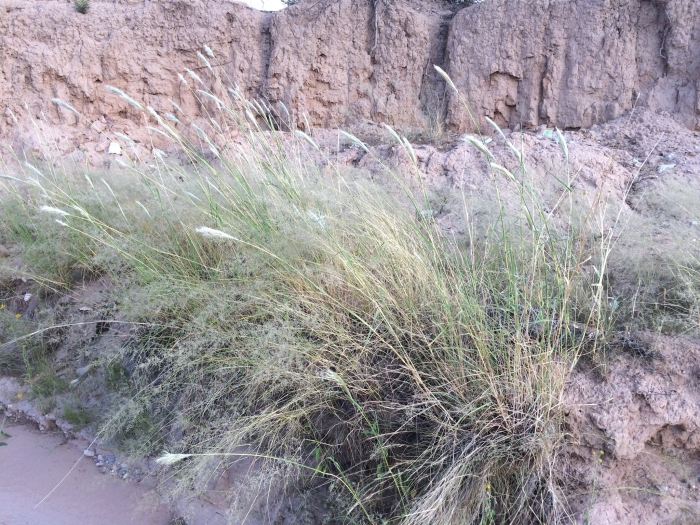Cane Bluestem
(Bothriochloa barbinodis)
Cane Bluestem (Bothriochloa barbinodis)
/
/

Cecelia Alexander
Public Domain
Image By:
Cecelia Alexander
Recorded By:
Copyright:
Public Domain
Copyright Notice:
Photo by: Cecelia Alexander | License Type: Public Domain | License URL: http://creativecommons.org/publicdomain/zero/1.0/ | Rights Holder: Cecelia Alexander | Publisher: iNaturalist | Date Created: 2017-09-15T23:49:55Z |
























































Estimated Native Range
Summary
Bothriochloa barbinodis, commonly known as Cane Bluestem, is an evergreen perennial grass native to a variety of habitats including open grasslands, scrublands, and riparian zones throughout the Americas. It typically forms upright clumps ranging from 60 to 120 centimeters in height. The plant’s distinguishing features include straw-colored stems with fringed nodes and blue-green leaves that mature to a reddish-yellow hue. Its inflorescence is a feathery array of spikelets, each consisting of a hairy, tan fertile spikelet with a twisted awn, accompanied by a smaller, sterile spikelet. The showy, wind-dispersed spikelets contribute to the ornamental value of this grass.
Cane Bluestem is valued for its drought resistance and is often used in xeriscaping, naturalistic plantings, and as a soil stabilizer due to its robust root system. It thrives in full sun and can adapt to a range of soil types, provided they have good drainage. While it requires medium water, it is notably drought-tolerant once established. Gardeners may use it as an accent plant for its attractive foliage and inflorescences. However, it can become invasive in some areas outside its native range, so care should be taken to manage its spread.CC BY-SA 4.0
Cane Bluestem is valued for its drought resistance and is often used in xeriscaping, naturalistic plantings, and as a soil stabilizer due to its robust root system. It thrives in full sun and can adapt to a range of soil types, provided they have good drainage. While it requires medium water, it is notably drought-tolerant once established. Gardeners may use it as an accent plant for its attractive foliage and inflorescences. However, it can become invasive in some areas outside its native range, so care should be taken to manage its spread.CC BY-SA 4.0
Plant Description
- Plant Type: Grass
- Height: 3-4.5 feet
- Width: 1-2 feet
- Growth Rate: Rapid
- Flower Color: N/A
- Flowering Season: Winter, Spring, Fall, Summer
- Leaf Retention: Evergreen
Growth Requirements
- Sun: Full Sun
- Water: Medium
- Drainage: Fast, Medium
Common Uses
Bank Stabilization, Deer Resistant, Groundcover, Low Maintenance, Salt Tolerant
Natural Habitat
Native to open grasslands, scrublands, and riparian zones throughout the Americas
Other Names
Common Names: Pinhole Bluestem, Feather Bluestem, Plains Beardgrass, Cane Beardgrass
Scientific Names: , Bothriochloa barbinodis, Andropogon barbinodis, Bothriochloa barbinodis var. barbinodis, Bothriochloa perforata, Bothriochloa barbinodis var. perforata, Andropogon barbinodis var. perforatus, Andropogon perforatus, Bothriochloa emersa, Andropogon schlumbergeri
GBIF Accepted Name: Bothriochloa barbinodis (Lag.) Herter